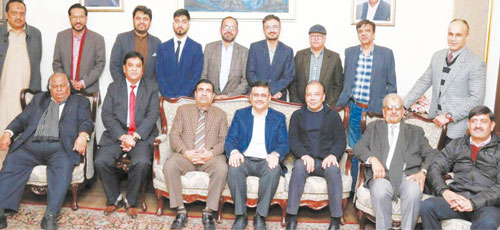Zubair Qureshi
The bilateral relations between Nepal and Pakistan have always been cordial and friendly and since the establishment of diplomatic ties in 1960 they have been growing steadily particularly in trade, tourism, climate change, education and culture.
These views were expressed by Ambassador of Nepal Tapas Adhikari at an ‘end of the year’ reception for media persons at his official residence Monday evening.
Senior anchorpersons and members of the journalist community of prestigious media houses attended the reception and had the taste of the mind-blowing Nepalese food particularly Momo— the bite-size dumplings made with a spoonful of stuffing wrapped in dough.
The other Nepalese delicacies included Tofu( made of soybean powder) ,Tama (bamboo shoot), chicken choila (masala chicken) and in dessert there was Sel Roti.
The guests enjoyed each one of them and relished their rich taste While greeting the journalists at his residence, the Nepalese ambassador underlined that both the countries enjoyed excellent bilateral relations based on goodwill, mutual trust and cooperation.
“Nepal and Pakistan celebrated the 60th anniversary of diplomatic relations in 2019,” he said, adding Nepal and Pakistan had similar views on issues of common interests at various regional and international forums.
Nepal opened its Embassy in 1962 in Karachi which was later shifted to Islamabad. Similarly, Pakistan has its embassy in Kathmandu since 1963. To a question, Ambassador Adhikari said Nepal and Pakistan relations further strengthened by the high-level interactions and people-to-people contacts.
Bilateral trade, similar cultural and social values based on agrarian economy, tourism and mountaineering, cooperation in education sectors, among others, have further enriched the bilateral cooperation.
The Nepalese ambassador also referred to the regional forum for development and good relations i.e. South Asian Association for Regional Cooperation (SAARC) and said both Nepal and Pakistan are founders of the SAARC and have been working to promote regional cooperation.
However, when asked what were the factors that did not let SAARC work effectively as other forums such as ASEAN did, he said there could be multiple reasons but assured Nepal wanted SAARC to play an active and effective role for peace, prosperity and progress of around 2 billion people of the SAARC countries.
Both Nepal and Pakistan have fragile ecosystems, he cautioned and added Hindukush-Himalayan region was prone to natural disasters. The region is a water tower of Asia which provides water to 3 billion people.
Climate change has impacted the ecology of these regions, he said adding the melting glaciers, changing agriculture patterns, migration etc had impacted the livelihood of people and recent flood in Pakistan is a living testimony of climate change in our region.
Therefore, Nepal and Pakistan need to work together to mitigate the negative consequences of climate change.
Ambassador Tapas who has been in Pakistan for a little over two years also shared his fond memories of visit to Multan where he met and interacted with the Nepalese students at the Bahauddin Zakriya University and Nishtar Medical College.
Pakistan, he said, had rich cultural and religious heritage and it is the place where great religions and philosophy like Hinduism, Buddhism, Sikhism and Sufism were established or flourished.










